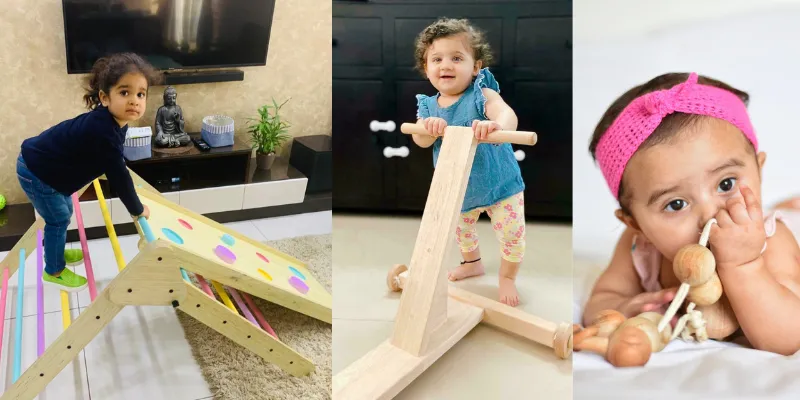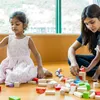This husband-wife duo’s toy startup aids child development during the formative years
Founded in 2018, Chennai-based toy startup, Ariro Wooden toys offer developmental toys like rattles, learning tower, and indoor gym, priced between Rs 200 and Rs 19,000.
In 2016, Nisha Ramasamy’s three-month-old daughter was diagnosed with atopic dermatitis, a skin condition that causes redness and itching. She also learnt that her child was allergic to plastic toys.
Nisha who was working as a Montessori teacher was keen on creating a Montessori environment. So, when her daughter started crawling and touching things around the house, Nisha started making wooden toys with the help of a carpenter.
There were limited options in the market for children aged between zero and three and the few that were available were imported.
“0-3 is a very important age where most development takes place. It is a time when the child will be able to communicate very little and it is up to the adults to see to their needs,” she tells HerStory.
Nisha took matters into her own hands and designed teethers and rattles using neem wood. Most of her friends, also parents, requested for similar toys for their children. This laid the foundation for Wooden Toys.
Founded with her husband Vasanth in 2018, the Chennai-based toy startup has now grown into a much-loved brand among children and parents.
A ‘Made in India’ toy story
As travel enthusiasts, the couple during their trips to countries like France, Sweden, Indonesia, and China, visited wooden toys’ manufacturing facilities and stores to understand the kind of wood and paint material used.

A few products of Chennai-based Ariro Wooden Toys
In China, they attended a toy expo where leading toy companies presented innovative solutions and they noted India has a long way to go to up their game in the toy market.
After returning to India, they started reaching out to toy manufacturers only to notice the capabilities of artisan clusters who had inherited talent from their ancestors.
At the same time, Nisha saw that small-scale toy manufacturers and artisans designed without knowing or analysing the best way to cater to children. The entrepreneur explained the products she wanted and sat with them to modify the samples multiple times before they were perfect.
The designs are conceptualised by Nisha and a team of Montessori teachers. She says, “We take the children’s sensitivity and physical development into account and design by considering that a four-month-old can grip only in a certain way.”
Priced between Rs 200 and Rs 19,000, it has 80 SKUs including pikler triangle, learning tower, puzzles, rattles, teethers, sliders, and step stool, and indoor gym accessories, among others.
Started with an initial investment of Rs 1 to 2 lakh, it is set to close the current financial year with revenue close to Rs 2.5 crore. Operating on dual models of B2B and B2C, its products are available on nearly 20 platforms including Amazon and Flipkart. Its B2B clients like the local Montessori schools have come to a standstill due to COVID-19.
At the same time, orders have increased online during the COVID-19-induced lockdown as parents look for different ways to keep their children engaged at home.
In November, the founders are planning to launch an experience store in Chennai, marking the startup’s foray into the brick-and-mortar model. It is also looking to raise funds.
The roadblocks
Nisha says explaining the concept of toys for developmental purposes to artisans and potential customers was a big challenge. With many modifications and working with artisans for over a year, they have come to a better understanding.
Despite manufacturing companies doing the work for half-the-price in India, the duo made sure to build a purely made in India product. Working with over 200 artisans at present, the startup hopes to increase the network of artisans as the market promises huge growth.
Moving ahead, it aims to expand quantitatively as well as quality by increasing awareness on the benefits of wooden toys.
Edited by Rekha Balakrishnan









